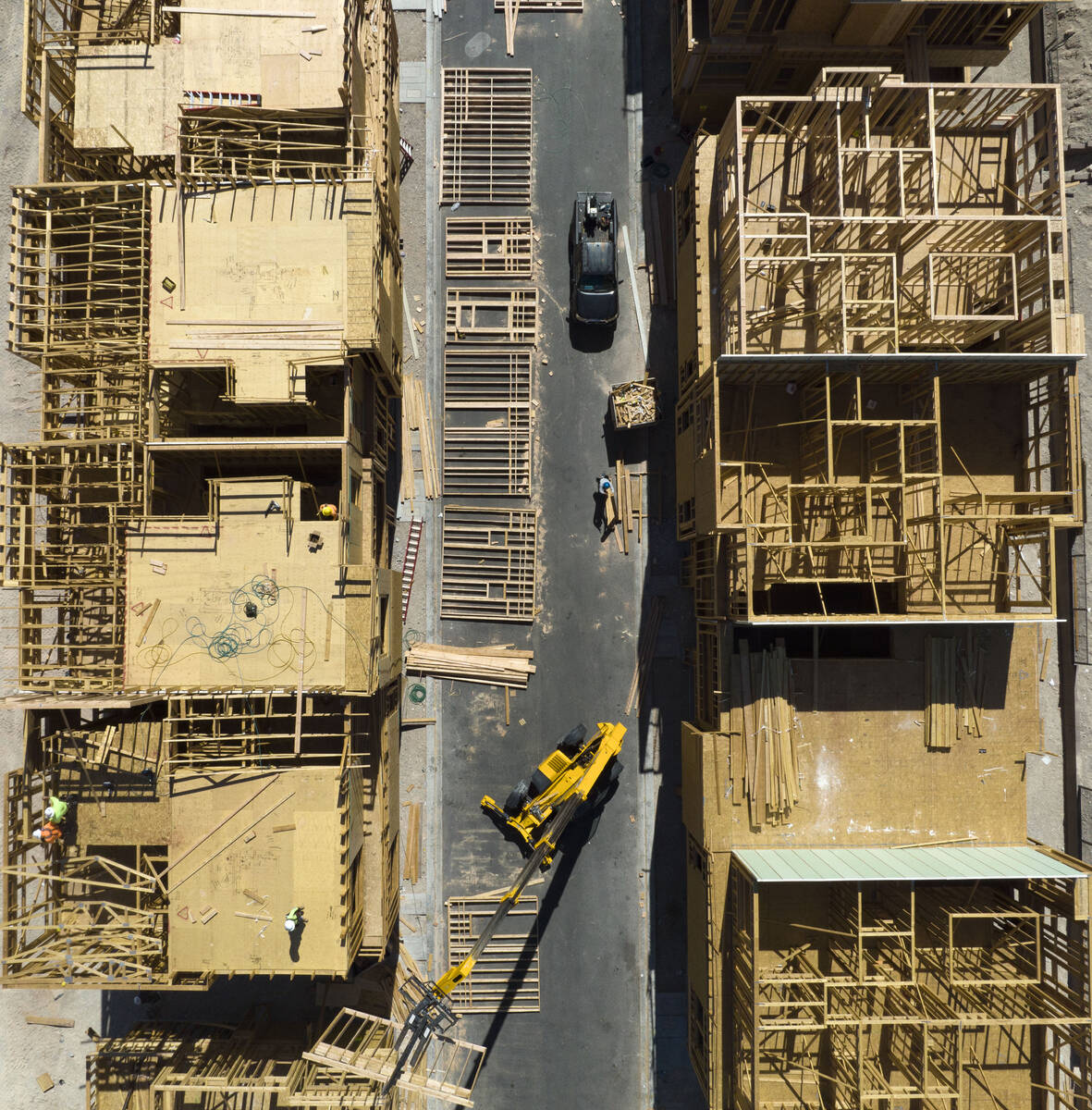Southern Nevada homebuilders came out of the 2023 Nevada legislative session happy with the results that got bills passed they sought and those they opposed defeated or vetoed.
Josh Hicks, president government affairs and advocacy group at McDonald Carano, and Lindsay Knox, the law group’s vice president, laid out the end results of the session to the Southern Nevada Home Builders Association during a recent luncheon.
“It was a very good session for us at SNHBA,” Hicks said. “The bills we wanted to pass (made it into law) and the bills we didn’t want didn’t (make it into law).”
One of the most important was Assembly Bill 213 on land use and zoning that easily passed and was signed by Gov. Joe Lombardo, Hicks said. It calls for the “efficient and expeditious” processing of land-use applications and improvement plans.
“I don’t think I have seen such a diverse and broad base of supporters for this bill,” Hicks said. “It had everyone from the construction industry and contractors to affordable housing groups and the culinary union. It was encouraging to see support for that bill and the large recognition that speeding up the process and getting more supply on the market is critical not just for the affordable housing piece but market-rate housing, too.”
Under the new law outlined by Hicks, local governments must publish on their websites pending residential land-use planning applications, including how long they have been pending.
Local governments must prepare an annual report identifying a plan to maintain and develop both affordable and market-rate housing needs within a community over five years.
Local governments must review a residential land-use application within 10 business days after it has been filed and failure to do so means the application is deemed complete. A local government that rejects a residential land-use application for incompleteness must provide specific reasons for the rejection. No reason was needed in the past for a rejection, and this will help applicants stuck in their application process, Hicks said.
A local government that establishes any kind of preliminary application process can’t use that process to circumvent the review periods. The Legislation clarifies that the time frames by which a county must review and process land-use applications also applies to cities within the county. It also requires that local governments prioritize land-use applications for affordable housing projects.
“I think one of the most important pieces of this bill is the legislative declaration,” Hicks said. “For many years, we’ve already argued about the supply side issues for housing affordability and the impact on home prices from a low supply. I was happy we were able to get some traction on that this year, and it talks about housing supply as a critical part of housing affordability balance. I think that’s something we can rely on for many years and something very helpful.”
Hicks said another important component in the bill was measuring how long when these applications for residential projects are going through the process.
“That’s been a point of frustration for many builders of understanding why it’s taking so long and where it is in the process,” Hicks said. “This bill will require it to be reported on a local government website, so seeing how long things are taking will be helpful that once we have that data we can figure out the solutions to deal with it.”
There were bills that weren’t backed by builders, Hicks said.
Senate Bill 371 that was passed by lawmakers and vetoed by Lombardo would have empowered a city to implement policies directed at rent control and inclusionary zoning.
“It has come up a few times over the years in different incarnations, and in this one was a delegation of authority to local governments to get into rent control and inclusionary zoning,” Hicks said. “This bill started out pretty broad and got broader and said local governments can do whatever they want as long as they are doing it for affordable housing.”
Senate Bill 427 that only passed the Senate would have required more regulations on job sites, especially in dealing with high temperatures. Hicks said construction sites are safe and the number of heat illness complaints were few.
“We didn’t oppose it because it was a bad idea,” Hicks said. “We opposed it because work sites are already safe, and we were concerned about overly prescriptive rules. “
Senate Bill 226 signed by Lombardo would have initially applied prevailing wages broadly to almost any type of construction, including residential, Hicks said.
It was amended to apply to only the construction of certain buildings constructed for the Nevada Higher Education System.
“The way SB 226 started out and was worded that the examples they gave of what would be covered by prevailing wage were so broad it was getting into privately financed projects in a lot of ways,” Hicks said. “That would have been something new in our state. There was a lot of pushback from a lot of industries, including the Home Builders Association. The labor unions were able to find something else to focus on besides prevailing wages on privately financed projects.”
Senate Bill 395 that was passed by lawmakers and vetoed by Lombardo dealt with corporate ownership of homes. It required corporate entities owing a residence to register with the Secretary of State. It also limited the number of residences that can be purchased by a corporate entity. The bill was amended so that it did not apply to the sale of newly constructed homes and intercompany transfers, Hicks said.
The bill was written out of concern that corporations were buying up homes, particularly in Las Vegas, renting them out and driving out long-time tenants and driving up prices. Hicks said if the bill comes back in the future, it’s hoped that the amended part remains and won’t apply to new construction.
Senate Bill 171 failed to advance in the Legislature. It allowed homeowners in a homeowners association to recover treble damages, special damages and punitive damages for personal injury or damage to property based on the HOA’s failure to comply with governing documents.
“This was something we were worried about for increased damages against builders (in the future), and we opposed that bill,” said Hicks, who added there was no construction defect legislation in the session.










